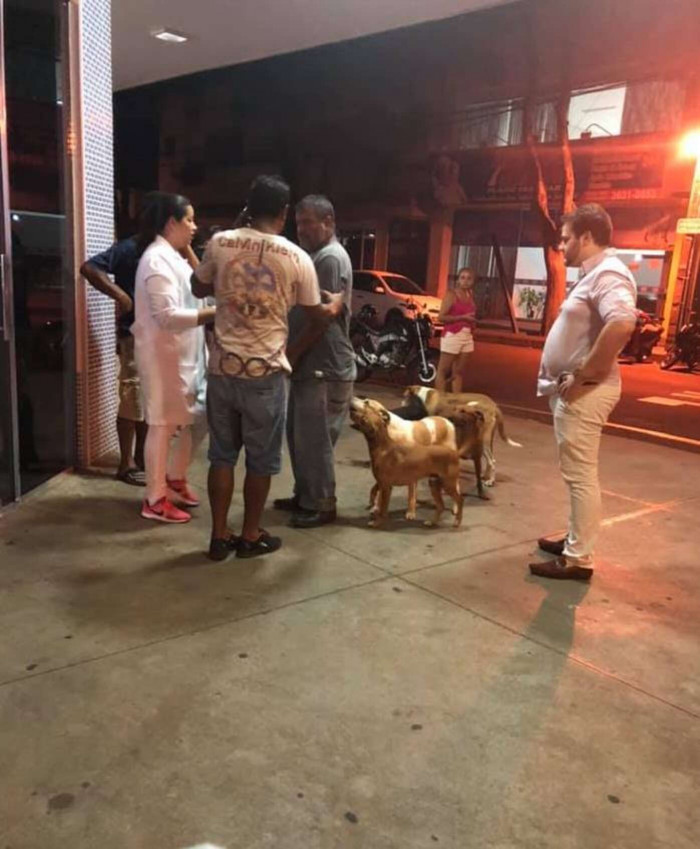Homeless Guy Was Rushed To The Hospital And His Loyal Dogs Waited For Hours Outside The Emergency Room To Make Sure He's Okay
A dog's never-ending loyalty is one of the characteristics that has earned them the title of being man's best friend. This kind of unbelievable trust was once again proven on the streets of Brazil.
Luiz was a homeless person for almost 20 years. He was down on his luck and chose to survive on the streets of Cianorte City in Paraná, Brazil.
Luiz has no family of his own, but he is accompanied by his six loving dogs. Despite Luiz's unfortunate situation, his dogs have never left his side.
As if his situation were not dire enough, the man suffered a stroke one night. A stranger who happened to witness what was happening assessed that Luiz was in need of help and called for an ambulance.
The medics arrived and administered first aid to Luiz. Minutes later, they decided to rush him to the nearest hospital.
The first responders thought Luiz was all alone. They had no idea that all six dogs that Luiz was caring for were running and following the ambulance that carried him.
After chasing the ambulance all the way to the hospital, the dogs patiently waited for their human to come out. Hours went by, and Luiz was nowhere to be seen, but the hospital staff noticed the pack of dogs lying down in front of the doors of the ER.
The hospital staff called a local dog rescue group to care for the pack.
The dogs were howling when Luiz was brought inside the hospital. They were beside themselves with worry for their kind owner.
Volunteers from Amigos de Patas Cianorte were called in to assess the situation. However, despite the volunteers' efforts, Luiz's loyal companions refused to leave the hospital premises.
Amigos de Patas Cianorte is a local animal welfare group. They took photos of the dogs waiting patiently outside for their owner.

The non-profit organization wrote a viral post on their Facebook account about the special moment.
The dogs remained outside the hospital for more than 24 hours. Luiz's dogs waited in vigil until they could be sure that he was safe.
Based on the account of the NGO, Luiz earned the loyalty of his pack by being kind to them. He treats all of his dogs well and shares everything with them.

The next morning, Luiz was discharged from the hospital with a clean bill of health. Unfortunately, he wasn't aware that his dogs were waiting for him outside, and he passed through a different exit without seeing his worried pups.
Luiz went home to his brother's place to rest further. All this time, the dogs were still at the hospital, waiting for their owner.
One volunteer from the organization had to fetch Luiz from his brother's house to tell him about his dogs. Luiz wasn't surprised that his faithful dogs had been outside the hospital the whole time he was there.
Finally, after more than 24 hours, Luiz and his dogs were reunited. The dogs could now stop worrying about their owner's health.

The bond between humans and dogs, especially in challenging situations, highlights the psychological concept of attachment theory. According to Dr. John Bowlby, attachment styles developed in early childhood can influence adult relationships and behaviors. A study conducted by the American Psychological Association found that pets can serve as secure attachments, particularly for individuals facing social isolation, such as the homeless.
These pets offer emotional support and companionship, which can mitigate feelings of loneliness and anxiety. Encouraging pet ownership among vulnerable populations may significantly enhance mental health outcomes.
The loyalty demonstrated by Luiz's dogs reflects the psychological principle of unconditional positive regard, a term popularized by Carl Rogers. This principle suggests that individuals flourish in environments where they feel accepted without conditions. Research indicates that pets provide this type of acceptance, fostering emotional well-being even under dire circumstances.
Ensuring that homeless individuals have access to resources such as pet-friendly shelters could enhance their quality of life. By addressing both human and animal needs, communities can create supportive environments that promote recovery and resilience.
Unconditional Love and Loyalty in Pets
The loyalty displayed by dogs, especially in the context of their owners' well-being, is deeply rooted in evolutionary psychology. Research indicates that dogs have evolved alongside humans for thousands of years, developing strong social bonds that enhance their attachment to us.
Dr. John Bradshaw, an animal behaviorist, explains that this loyalty is not just instinctual; it is also a learned behavior based on positive reinforcement from their human companions.
Luiz's family shared that they bought a simple house with a yard for him and his dogs. However, Luiz refused to enter the house and insisted that the streets were his home.
Even when the dogs were taken to a shelter, they refused to be caged. They escaped the shelter and found Luiz once again.
Now, Luiz and his dogs live happily and freely on the streets. It's a bittersweet story, but the love between Luiz and his pack shines at every moment.
Moreover, the emotional intelligence displayed by dogs can significantly impact their owners' mental health. Studies show that interactions with dogs can lead to increased levels of oxytocin, the hormone associated with bonding and emotional connection.
This biochemical response highlights the potential therapeutic benefits of having pets, particularly for individuals experiencing loneliness or emotional distress.
The Psychological Benefits of Pet Ownership
Owning a pet can also provide a sense of purpose and routine, which is essential for mental well-being. Psychological research supports the idea that structured daily tasks, such as caring for a pet, can enhance feelings of stability and security.
Engaging in regular activities with pets can promote a sense of responsibility, contributing positively to the owner's mental health.
Encouraging pet owners to create routines with their animals can further strengthen their bond. Research shows that shared activities, such as walking or playing, can enhance the emotional connection between pets and their owners.
This not only benefits the animals but also fosters a supportive environment for the humans involved, reducing stress and anxiety levels.
Psychological Analysis
This touching example showcases the extensive emotional bonds that can form between humans and animals. The loyalty exhibited by pets often stems from their innate need for connection and attachment, reflecting our own psychological needs for companionship.
Analysis generated by AI
Analysis & Alternative Approaches
The loyalty and love exhibited by pets remind us of the profound connections we can form with animals. According to Dr. Alexandra Solomon, a relationship therapist, "The bond we share with our pets can mirror the deep emotional connections we have with other humans, providing us with significant emotional support." These relationships can greatly enhance our quality of life. By nurturing these bonds, we can experience deeper fulfillment and joy in our daily lives.
Building Healthier Patterns
Research underscores the profound impact of the human-animal bond on psychological well-being, especially for marginalized groups. Studies indicate that animals can provide essential emotional support, significantly improving mental health outcomes in stressful situations. By acknowledging and nurturing these relationships, communities can foster resilience and recovery. As highlighted in multiple studies, integrating pet-friendly initiatives within social support frameworks could enhance the welfare of both individuals and their pets, creating a more inclusive society.



